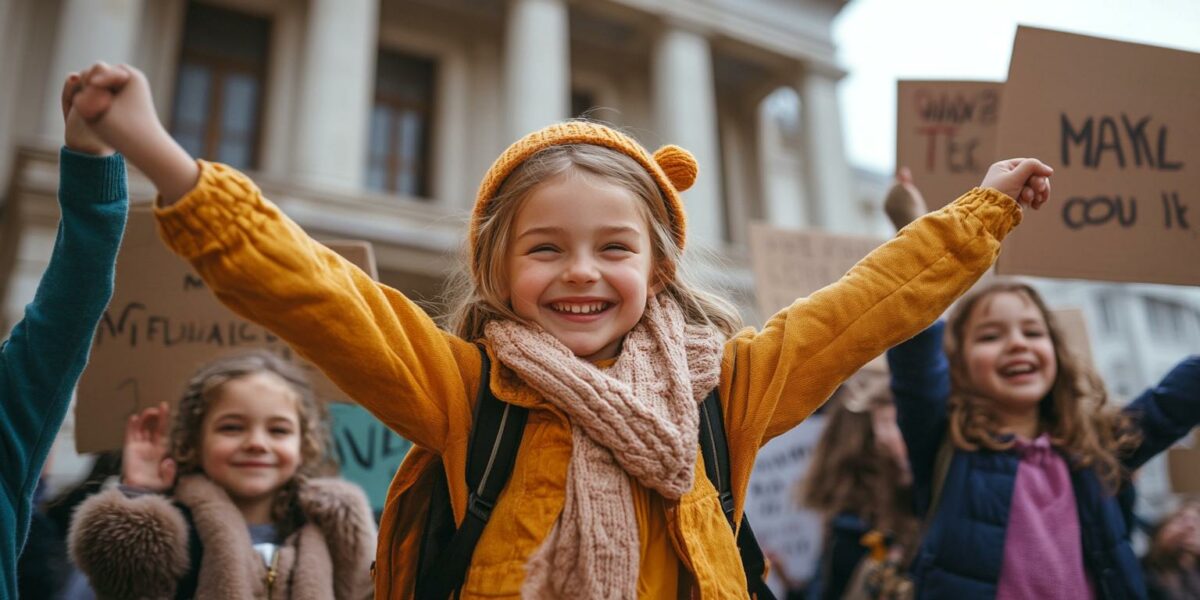Children Lead the Charge in South Korea’s Climate Battle
Eight-year-old Hannah Kim joined a groundbreaking legal action to compel South Korea’s government to safeguard future generations from the climate crisis. Despite her young age, Hannah’s efforts culminated in a major victory, setting a precedent for climate-related litigation in Asia. Her mother recalls the joy and tears when the verdict was announced.
Hannah’s triumph is just the start for these dedicated young activists. Her determination remains unwavering, as she vows to hold the government accountable for their climate promises. The constitutional court’s decision has undoubtedly amplified the voices of children and adolescents in South Korea.
The landmark ruling declared parts of South Korea’s climate law unconstitutional, emphasizing the importance of protecting the rights of future generations. Now, the national assembly must establish binding greenhouse gas reduction targets from 2031 to 2049 by February 2026. The government has committed to implementing these measures.
Another young activist, Jeah Han, has experienced the direct effects of climate change. Typhoons have disrupted her education and favorite activities, fueling her resolve to demand stricter carbon reduction goals. Jeah’s journey in climate activism began at age 10, driven by a desire to see real change.
From Picket Lines to Courtrooms
At 15, Hyunjung Yoon realized that traditional activism alone wouldn’t suffice. She joined the “youth climate litigation” group, which consolidated multiple lawsuits to amplify their impact. As a full-time climate activist, Hyunjung views the court’s decision as a pivotal moment in South Korea’s climate response.
South Korea’s climate litigation began in March 2020 with Youth 4 Climate Action, a group inspired by the global school strike movement. The initial lawsuit quickly expanded, bringing together 255 plaintiffs. This collective effort underscores the power of unity in advocating for environmental justice.
According to Hyunjung, Korea’s past climate efforts focused too narrowly on meeting targets, neglecting the growing risks to people’s lives. She emphasizes the need to prioritize safeguarding rights over merely hitting numbers. Legislative and administrative changes are crucial to prevent repeating past failures.
Hyunjung’s vision goes beyond raising awareness. She and her fellow activists are fighting to ensure that climate action genuinely protects lives, creating a society where everyone, regardless of their circumstances, is safe from climate risks.
Voices of a New Generation
Jeah Han’s commitment to climate activism has been unwavering since she was 10. Her efforts include:
- Participating in litter-picking activities
- Advocating for reduced plastic use
- Joining the climate litigation group
Despite feeling disheartened at times, Jeah remains determined to push for stricter carbon reduction goals. She believes that the government must respect citizens’ basic rights to dignity and happiness, as outlined in the constitution.
Hannah Kim’s strong stance on greenhouse gas reduction reflects the broader sentiment among young activists. They demand a detailed global plan to curb emissions and are committed to ensuring that promises are kept. The constitutional court’s ruling has galvanized their resolve to monitor and advocate for meaningful climate action.
The children behind South Korea’s landmark climate victory are not just raising awareness; they are driving significant change. Their legal battle has established a foundation for future progress, highlighting the power of youth in shaping environmental policies.
As these young activists continue to fight for a sustainable future, their message is clear: the world must take decisive action to protect the rights and safety of all its inhabitants. Their journey is a testament to the resilience and determination of the new generation in the face of the climate crisis.
A Turning Point for Climate Action in Asia
Last week’s unanimous decision by South Korea’s constitutional court represents a crucial milestone for climate action in Asia. By declaring parts of the climate law unconstitutional, the court has underscored the need to protect future generations and reduce the burden on them.
The ruling requires the national assembly to set legally binding greenhouse gas reduction targets, ensuring that the government takes concrete steps to address the climate crisis. This decision marks a significant shift in South Korea’s approach to environmental legislation.
For activists like Hyunjung Yoon, the court’s decision is more than just a legal victory; it is a call to action for comprehensive and sustainable climate policies. She believes that legislation must evolve to genuinely protect people’s rights and prevent the repetition of past mistakes.
The efforts of these young activists have laid a strong foundation for future progress. Their relentless advocacy has not only raised awareness about the severity of the climate crisis but also emphasized the need for inclusive and effective climate action. Their journey continues, inspiring others to join the fight for a safer, more sustainable world.



paisley
This is a good start, but it’s just the beginning. What’s the next step for these activists?
bentleydreamer
Does anyone know if similar lawsuits have been successful elsewhere?
Emma
Finally, some real action on climate change! Hope this sets a global trend. 😊
Adeline
How can I support these young climate warriors? Any groups to join or donate to?
Sofia5
I’m proud of these kids, but shouldn’t adults be leading the charge? 🤔
serenityastral
Such a heartwarming story! Thank you to all the young activists involved. 🌍💚
Leah
This is great news! Can we expect similar actions in other parts of Asia?
Christian3
Amazing! But how will they make sure the government actually sticks to these new laws?
David_Siren
Wow, go kids! This is so inspiring. Do you think other countries will follow South Korea’s lead?